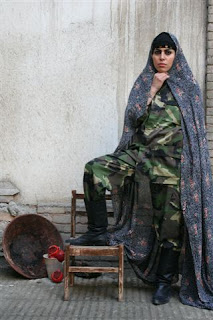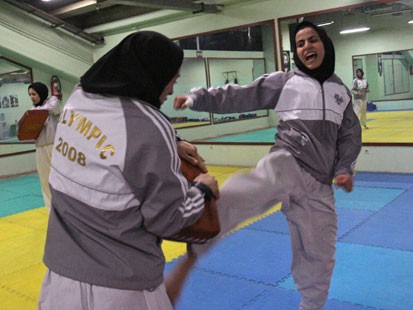The
Asia Times commentary by Bhadrakumar illustrates: Not successful at all!
I provide an annotated summary; but the entire article is worth reading as it provides context for what the popular press and Washington/New York pundits willfully, or negligently ignore.
Last Tuesday, Saudi Foreign Minister Prince Saud al-Faisal warned Tehran that its support to what he termed Hezbollah's "coup" in Lebanon would affect Iran's relations with Arab and Islamic countries. This was reported by the mass media as a rift between Iran and Saudis and taken as a serious cause of upcoming tension--augmented by Bush's visit to the Middle East. In other words, the "cosmopolitan" Saudi Prince flipped his "sectarian" card of divide between Shiites and the rest.
However the Saudi prince's intention to unnerve Tehran failed as " Tehran coolly ignored the Saudi foreign minister's warning. To make things doubly clear, Iranian President Mahmud Ahmadinejad said dismissively the Saudi prince spoke in "anger". Anger, we know, doesn't go well with good Muslims. Ahmadinejad then proceeded to make a startling revelation that Faisal was not following the "orders" of Saudi King Abdullah bin Abdul Aziz al-Saud. "
On Wednesday, King Abdullah quickly dissociated himself from his foreign minister's dire warning to Iran and the Saudi ambassador in Tehran, Osama bin Ahmad al-Sonosi, called on the chairman of Iran's Expediency Council, Akbar Hashemi Rafsanjani, to hand over a letter from the Saudi monarch containing an invitation to the Iranian cleric leader to visit Riyadh to attend the International Islamic Dialogue Conference. The Saudi ambassador reportedly said, "King Abdullah believes you [Rafsanjani] have a great stature in the Islamic world ... and he has assigned me the duty of inviting you to the conference."
This is an interesting revelation; as it has to be kept in mind that
Hashemi-Rafsanjani and Ahmadinejad are the opposing poles of the IRI: Ahmadinejad won the election against Hashemi; charging him with financial corruption--a charge many Iranians do not dismiss as Hashemi is the face of "capitalism" in Iran; and most probably in cahoots with neoconservatives. However, the power struggles in the IRI are very nuanced; and Hashemi, Ahmadinejad and the supreme leader seem to have a united front with regards to the Palestinian problem, Iraq, Nuclear Energy, Islamic republicanism and etc.
Rafsanjani accepted the invitation and stressed the need for understanding and comprehension amongst different Islamic factions.
The retraction of Saudi's is not surprising because "The entire Saudi political stratagem in Lebanon has backfired. The Saudi backing for the Foud al-Siniora government's moves to drag Hezbollah into a civil war stands badly exposed. A most awkward detail known to the "Arab street" is that Saudi intelligence and diplomacy was acting hand-in-glove with the United States in the dubious business of emasculating Hezbollah. The ultimate US-Saudi intention was to curtail Hezbollah's dominating stature on Lebanon's political and security landscape.
The crisis in Lebanon was proceeded by a barrage of propaganda in the Saudi-supported media aimed at discrediting Hezbollah in Arab opinion and to demolish its profile as Lebanon's resistance movement before disarming it.
However, "As it turns out, Hezbollah made the Siniora government and its Saudi backers look very foolish. As Israeli military intelligence chief Major General Amos Yadlin put it, Hezbollah proved last week that it is the strongest force in Lebanon - "stronger than the Lebanese army" - and could have seized power if it had wanted to. "Hezbollah did not intend to take control ... If it had wanted to, it could have done it," Yadlin told Ha'aretz newspaper. "
Ironically, "The Saudis have realized there aren't many takers in the Arab world for their anti-Iran, anti-Hezbollah ploys at present. Qatar, Yemen and Algeria have visibly dissociated from the Saudis. Syria continues to firmly align with Iran. Oman, which currently heads the Gulf Cooperation Council, is most disinterested in Saudi Arabia's anti-Iranian stratagems. The deputy to Oman's Sultan, Fahd bin Mahmoud al-Said, paid a successful visit to Iran on April 20. A visit by Oman's Sultan Qaboos to Iran is in the cards. Sensing its growing isolation, Riyadh mounted the latest Arab League mediation in Lebanon on Wednesday. The Arab League meeting itself was scarcely attended."
"The supreme leader of the Muslim Brotherhood in Egypt, Mohammed Mahdi Akef, said the Lebanese resistance is the only group that determines what is good for the country while facing the "Zionist-US plot that is penetrating deep into Lebanon". Akef stressed that in the Muslim mind, Hezbollah's image stands unshaken. Similar statements of solidarity have been made by other Sunni Islamic organizations in the Middle East, including in Jordan, despite the Jordanian regime's close alliance with Riyadh. Such solidarity of regional Muslim opinion favoring Hezbollah works to Iran's advantage. The Saudi king's invitation to Rafsanjani to visit Riyadh is a grudging acknowledgement of this political reality. Washington has been desperately keen to transfer the "Lebanon file" to the United Nations Security Council next week. US deputy National Security Advisor Elliott Abrams said in Washington on Tuesday, "We are going to be unrolling a few things in the course of the week, starting perhaps with the Security Council." But it is unlikely the Saudis will want a showdown with Iran over Lebanon at New York at this juncture."
"What is most extraordinary is that all this is playing out on the sidelines of Bush's own visit to the region. As things stand, the Middle East is seething with anger that the Bush administration has dumped the Israel-Palestine "peace process", despite all the hullabaloo at the Annapolis conference in the US last November. In addition, Bush's close identification with Israel profoundly alienates Arab opinion. The Bush administration's overall credibility is also very low, given the Iraq quagmire. Bush is being left in no doubt that the mood in the Middle East is firmly against any US adventurism against Iran. Curiously, Washington seems to anticipate the trust deficit in Riyadh and Cairo, the key Arab capitals that are on Bush's itinerary. "
" What it adds up to is that the Bush administration realizes that it is left with hardly any choice other than resorting to "Track II" diplomacy with Tehran. The Iranians are no more taking the lame-duck administration in Washington seriously. They know the Bush administration stands widely discredited in the Middle East. They know it is in any case necessary to deal with the new administration in Washington next year. They are shrewd enough to assess that any US exit strategy in Iraq that the incoming US administration formulates, will be critically dependent on Iran's cooperation.
Meanwhile, the axis involving Iran, Syria, Hamas and Hezbollah remains intact. Tehran knows it can afford to sit tight for the remaining period of the Bush administration. Of course, it should not do anything rash in the meantime that might provide an alibi to Washington to lash out. Most important, the Iranian regime knows its policy enjoys strong popular support within the country. "
" The most critical calculation behind Tehran's policy at the present juncture would be that US-Saudi ties have come under unprecedented stress, which in turn, incrementally, weakens Riyadh's leadership role and overall standing in the region. In an insightful dispatch from Riyadh, Karen Elliott House, the Pulitzer Prize-winning diplomatic correspondent and a former publisher of the Wall Street Journal, wrote in the newspaper on Wednesday that the US and Saudi Arabia are finding it "problematic" to steer their relationship, which is already "fraying" at its edges. The core ingredients of the traditional mutually beneficial relationship - a US security blanket in lieu of cheap Saudi oil - are lacking even as the "neighborhood around Saudi Arabia has become much more threatening". "
"
Riyadh is in two minds. The urbane Westernized Saudi foreign minister's uncharacteristic threat to ostracize Shi'ite Iran in the Islamic world on account of its regional policy in Lebanon harks to the past. The Saudi king's native wisdom in inviting an Iranian cleric leader to visit Riyadh at the present critical juncture beckons to the future. The House of Saud is apparently being pulled in different directions. "




















